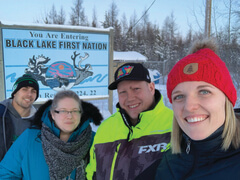
In January 2020, at the invitation of Black Lake Denesuline First Nation, a team from the Canadian Red Cross made the first of two trips to help build community resiliency for children, youth and adults.
What started with a request for educational workshops for youth related to building healthy relationships, positive social skills and violence prevention grew to be so much more. It became an illustrative example of the power of community engagement, an approach that the Red Cross in Saskatchewan has adopted.
“After the initial request, we connected with many different community agencies and leadership including the Chief and administration, and the school and health director,” said Kelsi Prince, Red Cross Violence Prevention Senior Advisor, who made the visit along with Indigenous Swimming and Water Safety Program Manager Lesley-Anne Morley, and Dan Clark and Jorgen Hus, Red Cross Ambassadors and Saskatchewan Roughriders.
“It really was a holistic approach of identifying the strengths in the community, as well as what their vision was for the future, where they saw any gaps and then from there, we were able to frame programming needs,” Prince explained.
During the visit, representatives provided workshops such as building healthy relationships to Grade 1 to 6 students, a babysitting course for Grade 6 students, recreational activities for Grade 7 to 12 students, and hosted a community feast to explore what is currently working well and what additional supports may be of assistance.
Clark and Hus were able to spend a lot of time connecting with youth of all ages, particularly the older ones who played volleyball daily. “When kids find something they are passionate about, it really hits home and it stays home for them,” Clark said.
After being in the community for a few days and spending time playing sports with the youth, Clark said he could see that there was a connection and a growing trust with the kids. “The platform of the Red Cross allows us to reach the community, but also it allows us to spread messages about healthy relationships and healthy and safe communities,” he said.
In addition to the school-based training, the Red Cross team met with several local community leaders and agencies to build connections, identify further needs and develop plans for on-going Red Cross programming.
This planning led to a second visit in March. With a focus on preparedness, several local volunteers were recruited and then provided two and a half days of training to become members of Red Cross Emergency Response and Personal Disaster Assistance teams.
“Those individuals are now able to respond as Red Cross volunteers when there is a house fire or other disaster and are also able to respond to the larger scale disasters like a forest fire,” Prince said.
Plans to return a third time to provide additional training such as Standard First Aid, Psychological First Aid, and water safety are on hold due to the COVID-19 pandemic; however, the Red Cross continues to work virtually with community leaders to provide programming.
“That’s at the heart of the Red Cross approach to community engagement,” Prince said. “It is community-led and based on their own strengths and capacity. It is about assisting where we can in building local capacity in areas where gaps have been identified by the community itself.”
Canadian Red Cross 2019-2020 Saskatchewan Report Back to the Community